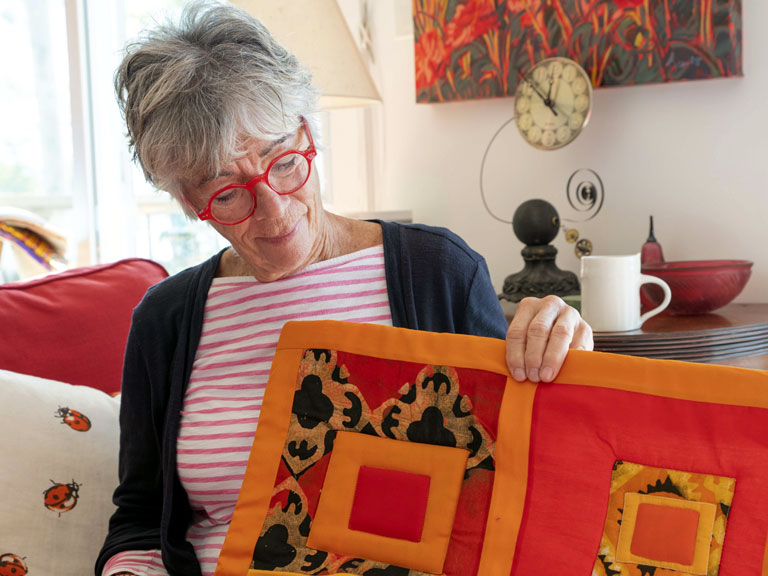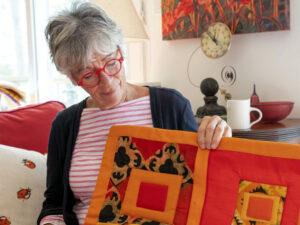County News
Textile Art Ghana

Postgraduate program creates new opportunities for women
Acolourful array of textile wall hangings cover Peta Hall’s dining room table. Another half-dozen or so are draped over one of the chairs. The colours are warm, vibrant and eye-catching, a clue to the fabrics’ origins from the sunny climes of Ghana. The patterns and arrangements of swaths of fabric are bold and imaginative—there’s nothing that could be termed muted about them. These are the work of eight Ghanaian women, graduates of the Atorkor Vocational Training Institute, who earlier this year were tutored by Institute founder Peta Hall in the skill of making fabric art. “There’s very little, if any, art taught in schools, but Ghanaians have an incredible colour sense and they dress in the most amazing wonderful mixture of colours and designs, and I thought what I need to do is teach them a technique, and then let them pull out of it what they want,” says Peta. “They had to figure out which colours looked good together, which ones jumped. I would say to them, ‘I want you to think about it, to sketch it, and talk to me to get your fabrics.’ I didn’t need to tell them how to sew a straight line, they had that technical skill.”

Peta Hall holds a textile wall hanging created by a participant at a workshop she held in Ghana to teach new skills to the graduates at the dressmaking program at the Atorkor Vocational Training Institute.
Peta had founded the Atorkor Vocational Training School after visiting the area in 2009 and witnessing the extreme poverty and high unemployment. Almost entirely with the help and donations from County residents, the school welcomed its first students in 2011. There were a total of eleven enrolled that year. Now operation of the school (renamed Institute) has been has been taken over by the local government, and enrollment is over 500, with subjects ranging from dressmaking to welding. One of the key improvements, again with the help of County residents, was the installation of a reliable solar power system, lessening the dependency of the Institute on outside electricity. With the school now firmly established, and many graduates going on to further their education at university, or establishing their own businesses, Peta began to look at ways to help the women graduates of the dressmaking program to better provide for themselves and their families. These women had the professional skills to make beautiful clothing, but lacked some of the business acumen in terms of purchasing or bookkeeping or administration. She decided to start a textile arts program, where the women could learn a new skill that would bring in more income, and could also learn some of the necessary business skills as well.
In preparation, Peta herself had to learn more about textile art. She received an intense course of training from Greta Kristiansen, from the PEC Quilters’ Guild. Another member of the Guild, Bill Stearman, began collecting essential things like scissors, cutting mats, needles and the like for Peta to take over to Ghana, where those items are well-nigh impossible to obtain. Returning to Ghana last winter, Peta worked with Dream Big Ghana (dreambigghana.org.uk) to establish a workshop for creating textile art. She invited women to take a proficiency test— making a fabric bag of a certain size—and eight of them were accepted into the program. She was limited to eight because that was the number of sewing machines she had. The program lasted six weeks, and the women themselves chose to come in three days a week, staying from 8:30 a.m. to 3:30 p.m.; Peta had only anticipated running the workshops two days a week. “They were so excited, and they needed very little direction once they got going. They were like absolute sponges trying to learn the techniques,” she says.
Before returning back to Canada from Ghana in March, Peta made the decision to bring almost all of the artwork the women created back with her, and she paid them there and then. It was a fortuitous choice. Two days after arriving, Canada was in lockdown mode due to the COVID-19 pandemic. Things in Ghana also came to a standstill. Dressmaking income for the workshop participants almost vanished, and they had to dip into the money they received for their artwork in order to survive. Peta had planned a late spring show and sale in the County for the artwork, to test whether there was a market for those items, and perhaps to act as a gauge for further expansion of the workshops in Ghana. The pandemic put a hold to those plans. Instead, there is now a website where the artwork can be purchased online: textileartghana.com. In addition, over the Thanksgiving weekend, the artworks will be displayed in the windows of Magpie on Picton Main Street.
Once travel restrictions ease, Peta intends to return to Ghana to continue the workshops. She would like to expand the size—she had to turn away a number of women who did well on the proficiency test simply because she had only eight sewing machines. She would also like to build a dedicated space for the women to work in; they had been sharing space in the library of the Dream Big Ghana learning centre. She sees this as building a strong foundation for the cooperative to eventually stand on its own, and she welcomes donation at the website mentioned above, or by e-transfer to petahall2@gmail.com. There are no administration costs involved, all of the donations go directly to the project in Ghana. Peta is very grateful for all of the support she has received. “I’ve been so blessed, but really, it’s this community,” she says. “That first building cost a quarter of a million dollars, all from the County. And for this project, Kato [Wake] did all the artwork, I had two writer friends who edited the text for the website, Greta [Kristiansen] taught me techniques, Bill [Stearman] raised money and supplies. So blessed that Alexandra Bake gave me the window space to safely being able to have the work up there and not restricted as to how many people could see it.” On the day the website was launched, 15 pieces were sold. That pile on Peta’s table may not be there for too much longer.

Comments (0)